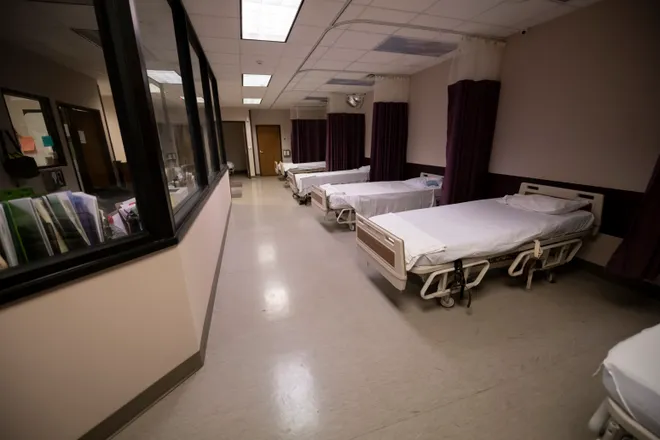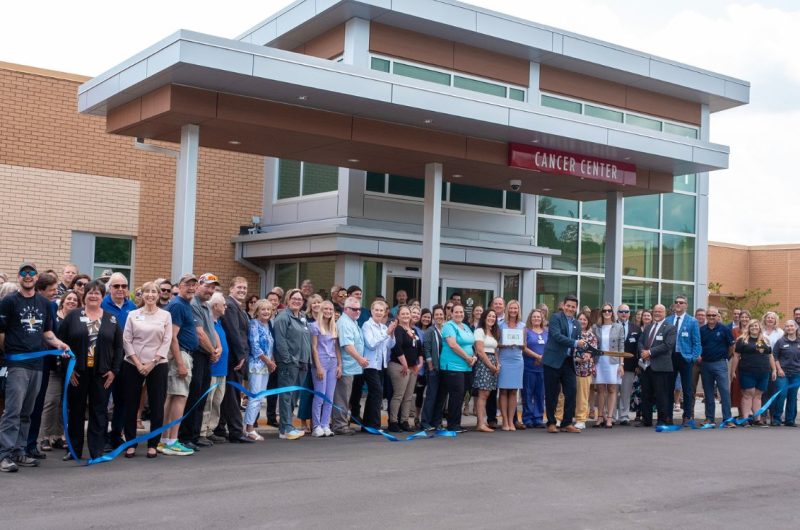Watkins: Here’s how we fix Michigan’s broken mental health system

This article originally appeared in The Detroit News and is being republished with permission. This is an opinion piece, and all views are those of the author and not Rural Insights.
Gov. Gretchen Whitmer and the Legislature must pull together to enhance and improve public mental health access and integration of care in the new year.
This is not a side issue that impacts “those people.” Mental health and substance use disorders impact every ZIP code and one in four people across this great nation of ours. Dr. Vivek Murthy, U.S. surgeon general, says the mental health crisis is the biggest health concern facing the country because it impacts so many people and different facets of life.
Much of the debate in Lansing under the guise of “reform” has centered around profitizing care, shifting the governance from locally controlled community mental health care to for-profit insurance companies. Luckily, this legislative effort led by Senate Majority Leader Mike Shirkey has been voted down.
Another battle has been won. The war over profit and greed versus care, service and compassion will surely continue with the proposed shifting of $3 billion of our tax dollars at stake annually.
Thank county sheriff and board of commissioner associations, police officer associations, local hospitals, the Community Mental Health Association of Michigan, National Alliance of Mental Illness (NAMI), Michigan Mental Health Association and other advocacy organizations for opposing this false-promise legislation that would place profits before people.
These bills were never about solutions to the real issues facing a system of care that does need additional support and sensible consumer-focused reforms. We must do better by serving — not profiting — from persons with behavioral health needs.
Here’s how we continue the pursuit of an integrated health care system that maximizes public resources, is consumer and community-focused and is data-driven and evidence-based:
- Eliminate the separation of physical health care services from behavioral health care. Integrate care at the consumer level where no person is turned away. Treat the whole person; the mind is connected to the body.
- Shut down services that continually abuse taxpayers’ resources while enriching themselves at the expense of those most vulnerable.
- Create crisis intervention teams for law enforcement throughout the state. Such partnerships between law enforcement and behavioral health care providers considerably improve care while reducing police officer injuries and costs when responding to mental health crisis calls. Sadly, our jails and prisons have become 21st-century psychiatric hospitals.
- Significantly step up audits on Medicare/Medicaid providers to identify and prevent fraud and abuse.
- Pay livable wages to direct-care staff. Stop the rhetoric about “supporting ‘essential’ workers” while paying invaluable staffers a pittance, often with no benefits.
- Fund advocacy organizations adequately to enable them to hold the system accountable. Without their watchdog eyes and ears the system will slip off track with devastating consequences to people’s lives.
- End the stigma of mental illness. Channel funds toward researching the causes of serious mental illness and developing responses to these disorders.
- Utilize digital technologies and artificial intelligence which have the potential to profoundly impact behavioral health services. We need to use predictive analytics to design programs that help people engage with behavioral health services — smart analytics could help educate people about behavioral health services.
- Continue insurance reimbursement for virtual mental health services after the COVID-19 crisis subsides. It works.
- Address shortages of certain specialty providers, including psychiatrists as well as eating disorder and autism specialists.
- Fund local community mental health agencies to work with schools to address psychosocial issues students face that were exacerbated by the pandemic.
- Create partnerships between behavioral health services and employers to boost awareness, acceptance, prevention and recovery within the workplace.
- Move nonviolent persons with serious mental health issues currently in our prison system to appropriate behavioral health programs.
- Hold hospitals accountable for serving people with serious mental illness. Michigan needs to get serious about using all the tools at its disposal, including certificates of need, licensing and tax policy forcing hospitals to accept public money to serve patients. Finding a psychiatric bed for someone with serious mental illness can often feel like their name is Mary or Joseph and it is Dec. 24 in Bethlehem. It is unconscionable that people with mental illness in need of hospital settings are denied service.
Decisions that benefit consumers and taxpayers instead of the “system” will lead us to a path that adds value and makes a difference. Without a shift in emphasis from profit to quality care, future policymakers will be confronted with an unfathomable mess to clean up.
Let’s work together to enhance care, support and opportunities for strangers, friends and family members with an illness or disability.
A friend with cerebral palsy once called me a TAB: temporarily able-bodied. He explained that we are all one life-changing event away from needing some level of assistance. There but for the grace of God, go I.
Let’s act as if improving the behavioral health service in Michigan will help someone you love — because it will.
Tom Watkins has served the citizens of Michigan as state mental health director as well as president and CEO of the Detroit Wayne Integrated Health Network.






The problems in Michigan go back to the single greatest failure of American society—our lack of universal healthcare. It’s shameful really. The richest country in the world, and THIS is the best we can do? Pretty sorry really. Profits over people will not change until for-profit healthcare is ended in America.
This article says nothing about how to solve the mental health problem; it’s a bunch of flowery, feel good, language. We’ve closed the bulk of our mental institutions, put the patients on the streets where they’re self medicating with alcohol & street drugs and living under tarps. Because there are no alternatives, and because we allow, children with mental problems are sent to public schools where they disrupt classes & absorb a large portion of school budgets instead of our funding specialized schools where personnel are trained to handle such students, where they can be integrated into society or receive proper mental health care. We’ve a totally broken mental health system and it’s not going to be fixed with gobbledygook language; the legislature is going to have to make some hard decisions to fix our mental health system.
I agree with Tom Harris. Watkins named goals that have been voiced for years. What we need are ways to achieve these goals!
Perhaps Tom Watkins believes we should implement the wonderful “universal” health care system that Canada has been so successful in utilizing. Government paid bureaucrats are just as devious as for-profit companies in exploiting any system for their own personal benefit—maybe to an even greater degree!
Mr. Watkins suggests, “we must do better by serving,” not profiting. Sadly, his idea of serving is a bureaucrat wish list of new programs. He says. “Here’s how we continue the pursuit of an integrated health care system that maximizes public resources, is consumer and community-focused and is data-driven and evidence-based…” Whatever that means.
He says, “Treat the whole person.” Sounds good.
Then we need to:
-step up audits
-pay livable wages
-fund advocacy organizations
-channel funds toward researching the causes of serious mental illness (Really?)
-Utilize digital technologies and ARTIFICIAL INTELLIGENCE (What??)
– Insurance reimbursement for virtual mental health service (because it’s no problem diagnosing bipolar or schizophrenia over a Zoom call.)
-Fund local community mental health agencies to work with schools (yes, great idea! Let’s mandate presentations to social workers. That will work!)
-Address shortages of certain specialty providers, including psychiatrists (do you think this might help in care delivery? Having qualified doctors? Hmmm…he’s on to something, finally.)
-Move nonviolent persons in prison to appropriate behavioral health programs (THERE AREN’T ANY PROGRAMS THUS WE HAVE A CRISIS)
-Hold hospitals accountable
In conclusion, we need ‘decisions that benefit consumers and taxpayers instead of the “system.”
He just proposed a list of bureaucratic solutions that have nothing to do with the immediate needs of any suffering human being. He’s not serious about solving anything for anyone.
As an ER and corrections nurse, I can’t thank you enough for this article. All facets of government should have to shadow us as health professionals for 24 hours. Then, maybe, they would truly see the issues we face with getting patients the help they need in a timely manner. We sometimes have patients on a 72 or more hour hold, in our EMERGENCY DEPARTMENT, while we wait for an accepting facility. It is not right and it needs to change.
With it being “Mental Health Awareness Month”, Gov. Whittmer is all about patting Herself on that back for recent Legislation She pushed through. It’s Too Little to late and is a cheap win for an Election Year. Most Funding goes for Downstate and leaves Parents in the Upper Peninsula with waiting lists for few beds. Facilities have been closed, lack of alternatives and facilities such as Pathway’s and Great Lakes fall extremely short of any meaningful, adequate and competent Mental Health Care.
Judges in Michigan receive “Incentive” Funding to place children into Foster Care on bogus CPS investigations, removing Children unnecessarily and without due process. In most cases since the Drug/Behavior and rehab process doesn’t extend beyond two week’s, these Kid’s go through several rounds of in and out of the Justice/Rehab systems with zero improvement, recitivism is rampant and as long as the money flows, No one’s Mental Health improves.
Social Workers tend to blame Parents and create conflict where there is none. They create stress for Parents and undue financial hardship. The basis for some alerting CPS to “Alleged” Abuse is alarming, No legal evidence is needed, just a rumor or opinion.
That’s totally Insane. Most People wouldn’t recognize abuse signs and do not have any medical training. The criteria for these “Reports” is zero. Parent’s have the right to know their accuser(s) and should not case be found, Liable for tort lawsuits.
The Time to stop talking and Walk the Walk is Now. We cannot afford to lose one more child.
Great article! It really gets to the heart of Michigan’s mental health challenges and offers real, practical solutions. I love the focus on breaking down barriers and making care more accessible—it’s such an important issue that affects so many people. The recent signing of Senate Bill 27, Michigan’s first mental health parity law, is a significant step toward ensuring equal insurance coverage for mental health and substance use disorder treatments.  Additionally, the allocation of $125 million in supplemental funding for school safety and mental health support demonstrates a commitment to addressing these critical needs.  Thanks for starting this conversation!
Tom Watkins effectively identifies systemic flaws in Michigan’s mental health system—such as the harmful separation of physical and behavioral healthcare, inadequate provider wages, and misuse of tax dollars.